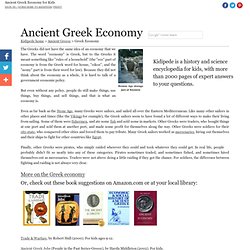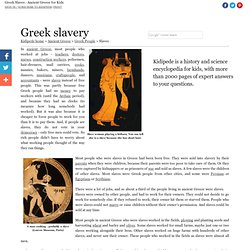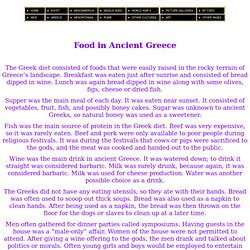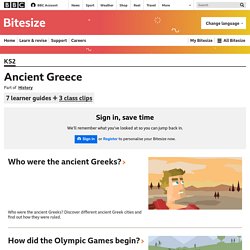

Ancient Greece - Gods and Goddesses - The British Museum. Ancient Greece - Gods and Goddesses - The British Museum. Ancient Greek Economy. Bronze Age storage jars at Knossos The Greeks did not have the same idea of an economy that we have.

The word "economy" is Greek, but to the Greeks it meant something like "rules of a household" (the "eco" part of economy is from the Greek word for house, "oikos", and the "nomy" part is from their word for law). Because they did not think about the economy as a whole, it is hard to talk of a government economic policy. But even without any policy, people do still make things, use things, buy things, and sell things, and that is what an economy is. Even as far back as the Stone Age, many Greeks were sailors, and sailed all over the Eastern Mediterranean.
Finally, other Greeks were pirates, who simply raided wherever they could and took whatever they could get. More on the Greek economy Or, check out these book suggestions on Amazon.com or at your local library: Trade & Warfare, by Robert Hull (2000). Ancient Greek Jobs (People in the Past Series-Greece), by Haydn Middleton (2002). Ancient Greece for Kids - Myths, Gods, Wars, People, School, Pets, Vases, Columns, Democracy, Games, Geography, ore. Greek Slaves. Slave woman playing a kithara.

You can tell she is a slave because she has short hair. In ancient Greece, most people who worked at jobs - teachers, doctors, nurses, construction workers, policemen, hair-dressers, mail carriers, cooks, nannies, bakers, miners, farmhands, dancers, musicians, craftspeople, and accountants - were slaves instead of free people. This was partly because free Greek people had no money to pay workers with (until the Archaic period), and because they had no clocks (to measure how long somebody had worked). But it was also because it is cheaper to force people to work for you than it is to pay them. And, if people are slaves, they do not vote in your democracy - only free men could vote. A man cooking - probably a slave(Louvre Museum, Paris) Most people who were slaves in Greece had been born free.
There were a lot of jobs, and so about a third of the people living in ancient Greece were slaves. A slave nanny taking the baby (see the loom behind her?) Or. Food in Ancient Greece. The Greek diet consisted of foods that were easily raised in the rocky terrain of Greece’s landscape.

Breakfast was eaten just after sunrise and consisted of bread dipped in wine. Lunch was again bread dipped in wine along with some olives, figs, cheese or dried fish. Supper was the main meal of each day. It was eaten near sunset. It consisted of vegetables, fruit, fish, and possibly honey cakes. Fish was the main source of protein in the Greek diet. Wine was the main drink in ancient Greece. The Greeks did not have any eating utensils, so they ate with their hands. Men often gathered for dinner parties called symposiums. Daily Life in Ancient Greece Children Clothing Fashion Food Home Life Marriage Men and Women's Roles Shopping Women Historyphoto101.com - Great History Photos, Right Price Follow our updates on Facebook or Twitter Pictures on this page are for viewing only. Please see Pictures Galleries for Royalty Free images for Educational uses. See Our New Photo Site HistoryPhoto101.com.
Ancient Greece for Kids. Ancient Greece - The British Museum. Primary History - Ancient Greeks. Who were the ancient Greeks?

Who were the ancient Greeks? Discover different ancient Greek cities and find out how they were ruled. How did the Olympic Games begin? Learn how the Olympic Games began over 2,700 years ago! Find out what events were at the ancient Olympics. What was it like to live in an ancient Greek family? Ancient Greece. Ancient Greece - History, mythology, art, war, culture, society, and architecture. Ancient Greece for Kids - Woodlands Homework Help. Ancient Greece. The Parthenon, a temple dedicated to Athena, located on the Acropolis in Athens, is one of the most representative symbols of the culture and sophistication of the ancient Greeks.

Ancient Greece was a Greek civilization belonging to a period of Greek history that lasted from the Archaic period of the 8th to 6th centuries BC to the end of antiquity (ca. 600 AD). Immediately following this period was the beginning of the Early Middle Ages and the Byzantine era.[1] Included in ancient Greece is the period of Classical Greece, which flourished during the 5th to 4th centuries BC. Classical Greece began with the repelling of a Persian invasion by Athenian leadership. Because of conquests by Alexander the Great, Hellenistic civilization flourished from Central Asia to the western end of the Mediterranean Sea. Chronology Ancient Periods Astronomical year numbering Dates are approximate, consult particular article for details Historiography History Archaic period.